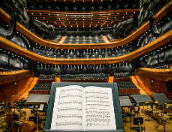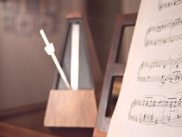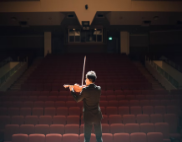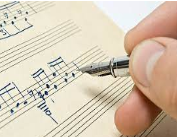The standards for Middle School Instrumental Music, Intermediate Level enable students to continue to develop basic musicianship and music literacy. Students examine inquiry-based questions related to music as part of a creative process. Students increase individual technical skills while developing their understanding of the collaborative skills required to create and refine music for ensemble performance. Music literacy skills are emphasized as students read, notate, sight-read, and perform music. Students respond to, describe, interpret, and evaluate music as performers and listeners, and experience music from a variety of cultural influences, styles, composers, and historical periods. Students compare and contrast career options in music and examine the relationship of instrumental music to the other fine arts. Opportunities are provided for students to participate in local, district, and regional music events as appropriate to level, ability, and interest. The student is usually expected to furnish his or her own instrument. After-school rehearsal and performances may be required of students.
Band 6 or Director's approval
Essential Question: How do I connect with, respond to, perform, and create music?
|
Quarter |
Quarter 1 |
Quarter 2 |
Quarter 3 |
Quarter 4 |
|
Unit Title |
All the World's a stage, let’s get ready for the audition! |
The strength of the foundation determines the quality of the musician. |
Strong foundations lead to increased ensemble musical awareness. |
Strong musical awareness leads to greater exploration. |
|
Image Cue |

|

|

|

|
|
Focus of the Story |
The year begins learning how to prepare for an audition and exploring more complex technical skills, while sight-reading and playing new literature. New articulation techniques are explored as a means to enunciate sound. The pacing of individual practice will be explored to create a successful audition routine. |
The work continues on scales and rudiments with an emphasis on expanding our range. We will refine performance techniques and work on exercises to improve tone. Students will prepare for the Winter Concert and All-City Music Festival auditions. |
In the third quarter we examine our individual performance skills as it relates to an overall group performance. The journey begins developing critical listening skills. We will learn to adjust to musical nuances, and expand instrumental technique. The ensemble may participate in a District Assessment performance. |
We end our year continuing to perform with the preparation of individual solos. We will experiment with music notation technology to create our own music and explore a variety of musical career paths. |
|
Transfer Goals |
Use music literacy to demonstrate understanding of the elements of music and the ways they inform artistic performance and creative expression. Analyze, interpret, and evaluate musical works from a variety of cultures. Use technology as a strategic mechanism for improving music literacy and improving music performance. |
Understand and apply creative processes to guide the development of ideas, original works, and musical performance. Analyze, interpret, and evaluate musical works from a variety of cultures. Understand and find meaning in music as a form of community engagement through involvement as a performer, supporter, advocate, and audience member. Use music literacy to demonstrate understanding of the elements of music and the ways they inform artistic performance and creative expression. Explore and connect personal interests, experiences, and aspirations through vocation, advocacy, and arts patronage.
|
Understand and apply creative processes to guide the development of ideas, original works, and musical performance. Analyze, interpret, and evaluate musical works from a variety of cultures. Understand and apply creative processes to guide the development of ideas, original works, and musical performance. Use music literacy to demonstrate understanding of the elements of music and the ways they inform artistic performance and creative expression.
|
Understand and apply creative processes to guide the development of ideas, original works, and musical performance. Analyze, interpret, and evaluate musical works from a variety of cultures. Understand and find meaning in music as a form of community engagement through involvement as a performer, supporter, advocate, and audience member. Use music literacy to demonstrate understanding of the elements of music and the ways they inform artistic performance and creative expression. Explore and connect personal interests, experiences, and aspirations through vocation, advocacy, and arts patronage. Curate a portfolio of accomplishments, experiences, and performance materials exhibiting oneself as an artist. Use technology as a strategic mechanism for improving music literacy and improving music performance. |
|
Learning Targets |
I can perform my concert Bb, Eb, F, Ab,Db, G and C major scales and tetrachords. I can perform with a good quality sound. I can match pitch and play in tune. I can practice efficiently and effectively. I can clean and care for my instrument properly. I can describe the characteristics of Classical era music. I can compose variations from a theme in ¾ time. I can count single 8th notes, rests, and syncopated rhythms. I can understand how to divide the beat. I can identify basic intervals. I can use established sight reading procedures to new music. I can perform basic articulations to my music. |
I can identify enharmonic names for my notes. I can define allegretto. I can prepare for my winter concert. I can sing my music/my part. I can perform a one octave chromatic scale. I can perform with various articulations. I can prepare for all aspects of the All-District Band Audition. I can describe the characteristics of music from the Romantic Era. I can demonstrate good audience and listening skills. I can evaluate my own performance. I can listen to and evaluate music performances. I can identify why I like/dislike music using correct terminology. I can sight-read full band selections. |
I can prepare my part/music for our band assessment performance. I can understand how my part contributes to the full music or ensemble. I can follow our established sight-read procedures. I can sight-read a full band piece at grade level. I can reflect on and evaluate my assessment performance. I can prepare for my All-City Audition.
|
I can select and prepare an appropriate solo of my choice. I can perform music using 16th note rhythms and variations. I can perform music in cut-time. I can perform music using triplets. I can perform concert G and D minor scales. I can improvise simple melodies in a call and response style. I can prepare my music for our spring performance. I can identify multiple career options involving music. I can research music using good digital citizenship and technology skills. I can compose using music technology . I can relate music to other fine arts. I can assess what I have learned and how I have grown throughout this course. |
